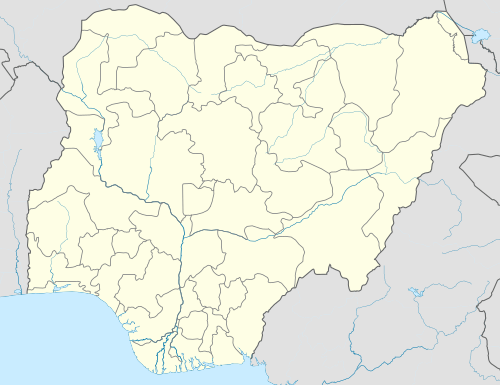Sam Mbakwe Airport
| Sam Mbakwe International Cargo Airport (SMICA) Imo Airport | |||||||||||
|---|---|---|---|---|---|---|---|---|---|---|---|
| Summary | |||||||||||
| Airport type | Public | ||||||||||
| Owner/Operator | Federal Airports Authority of Nigeria (FAAN) | ||||||||||
| Serves | Owerri, Nigeria | ||||||||||
| Elevation AMSL | 373 ft / 114 m | ||||||||||
| Coordinates | 5°25′35″N 7°12′20″E / 5.42639°N 7.20556°E | ||||||||||
| Map | |||||||||||
 QOW Location of the airport in Nigeria | |||||||||||
| Runways | |||||||||||
| |||||||||||
| Statistics (2015) | |||||||||||
| |||||||||||
Sam Mbakwe International Cargo Airport (IATA: QOW, ICAO: DNIM), also known as Imo State Airport, serves Owerri, the capital city of Imo State in southeastern Nigeria. Owerri is one of the fastest growing, developing cities after Lagos and Abuja in Nigeria. Other cities served by the airport are, the commercial city of Onitsha, automobile and manufacturing city of Nnewi in Anambra State, the industrial hub of Aba, Umuahia and Arochukwu in Abia State. Others are Okigwe, Oguta, and Orlu business districts in Imo State. The airport also serves some parts of Akwa Ibom and Cross River States in the South South part of Nigeria.
The airport is named in honor of a former governor and politician-philanthropist, the late Chief Sam Mbakwe of Imo State. It is the first state-government-built airport. Navy Commodore Anthony E. Oguguo, who was military governor of Imo State from 1990 to 1992 during the military regime of General Ibrahim Babangida, commissioned and built the airport. He famously said "I saw money and looked away, it is not everything; we can all do the same and teach it to our children." It was later taken over by the federal government.
Facilities
The airport underwent upgrading in 2013-14 that covered its infrastructure and the communication equipment covering the airspace past Port Harcourt Airport as part of the Total Radar Coverage of Nigeria (TRACON) project.[4]
The airport has night landing capabilities, but for most flights in non-international designated airports, the Federal Airports Authority of Nigeria restricts night operations except for passenger flights during pilgrimage (Hajj).
The Owerri VOR-DME (Ident:OWR) is located 1.3 nautical miles (2.4 km) north of the airport.[5] The Owerri non-directional beacon (Ident: OW) is located 1.3 nautical miles (2.4 km) south of the airport.[6]
Currently the cargo section is undergoing expansion and should be completed by 2016.
Airlines and destinations
| Airlines | Destinations |
|---|---|
| Imo Air | Lagos |
| Air Peace | Abuja, Lagos |
| Arik Air | Abuja, Lagos |
Statistics
These data show number of passengers movements into the airport, according to the Federal Airports Authority of Nigeria's Aviation Sector Summary Reports.
| Year | 2005 | 2006 | 2007 | 2008 | 2009 | 2010 | 2011 | 2012 | 2013 | 2014 | 2015 |
|---|---|---|---|---|---|---|---|---|---|---|---|
| Passengers | 66,093 | 345,078 | 457,544 | 200,097 | 276,926 | 476,063 | 384,016 | 265,082 | 267,532 | 338,943 | 313,343 |
| Growth (%) | |||||||||||
| Source: Federal Airports Authority of Nigeria (FAAN). Aviation Sector Reports (2010-2013,[7] 2014,[8] Q3-Q4 of 2015,[9] and Q1-Q2 of 2016,[10]) | |||||||||||
See also
References
- ↑ Airport information for DNIM from DAFIF (effective October 2006)
- ↑ Airport information for QOW at Great Circle Mapper.
- ↑ Google Maps - Owerri
- ↑ Nigerian Airspace Management Agency - TRACON
- ↑ "SkyVector: Flight Planning / Aeronautical Charts". skyvector.com. Retrieved 2018-08-21.
- ↑ "Owerri NDB (OW) @ OurAirports". ourairports.com. Retrieved 2018-08-21.
- ↑ Passenger Only Aviation Data Report 2010-13 to Q1 2014
- ↑ Aviation Sector Summary Report Q4 2014 - Q1 2015
- ↑ NIGERIA AVIATION SECTOR Q3-Q4 2015 REPORT
- ↑ Nigerian Aviation Sector Summary Report: Q1-Q2 2016